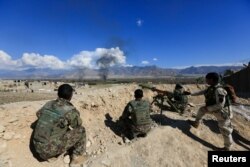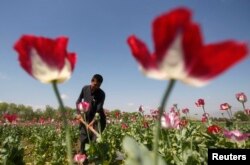Afghanistan made improvements on a number of fronts this year but still faces major challenges, ranging from the rejuvenated Taliban and other opposition forces to widespread corruption, challenges in putting together elections, a boom in heroin production and ongoing tensions with neighboring Pakistan, an annual U.N. report says.
After decades of war and chaos, the country again appears to be at a crossroads that depends in part on whether the Taliban will give up terrorism and crime in exchange for dialogue with the government aimed at fostering a lasting peace.
"The security situation remained highly volatile, as the Taliban and Islamic State in Iraq and the Levant-Khorasan Province (ISIL-KP) showed continued capacity for inflicting mass casualties amid increased Afghan and international air strikes," said the report by the United Nations Assistance Mission in Afghanistan.
The report was the topic for a series of speeches at the U.N. Security Council on Thursday, with hopes raised that several international efforts to bridge political divides may eventually yield success, while diplomats from several countries expressed concerns about the drug boom and the long-term prospect of instability and terrorism spreading from Afghanistan.
The U.S. expressed willingness to "partner with anyone" to bring peace to Afghanistan, and Kabul's U.N. ambassador said he hopes "cooperation will foster cooperation."
While Pakistan was rarely mentioned by name, there were repeated references to the need for Afghanistan’s neighbors to be fully engaged and committed to the peace process, saying there is no military solution to the violence.
President Donald Trump’s new policy for Afghanistan has included pressuring Pakistan to do more to track down on terror groups that are believed to have taken refuge there. Islamabad has sharply denied the allegations and claims no such groups are living on its soil.
While tensions between Pakistan and Afghanistan spiked several times during the year, leading Islamabad to shut border crossings for extended periods and start to build a border wall, there also have been some recent positive signs. Islamabad has separately sent its military chief and a parliamentary delegation to Kabul for talks.
Another recurring theme at the Security Council underscored the need for continued international assistance, with speakers saying Afghanistan is not capable of self-reliance yet but that it must play the leading role in working out a peace deal.
And endemic corruption continues to plague the country.
"The National Unity Government continued to prioritize its reform agenda, with an emphasis on anti-corruption measures and security sector reform, in the face of ongoing security and governance challenges," the U.N. report said.
The election process has been slowed by a series of setbacks that have undercut public confidence, though plans still call for parliamentary and district council polls in 2018.
More children were in school and getting vaccinations this year, while women were making advancements, including greater political involvement. Production of several major crops jumped, particularly saffron.
But the biggest money crop — opium poppies — also skyrocketed. The Taliban relies on revenue from opium and heroin to fund its operations.
Heroin production was up 87 percent, leading to a U.S.-led bombing campaign against drug labs.
VOA Afghan contributed to this report.







